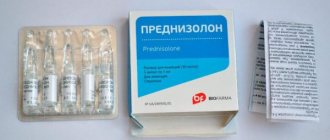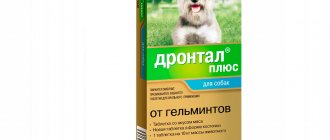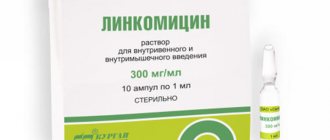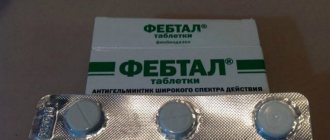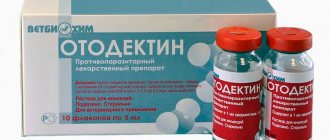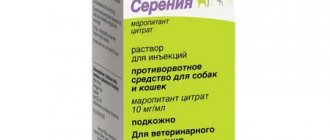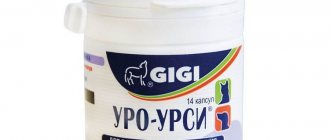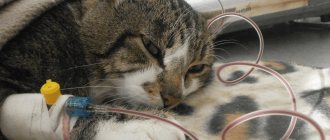Content
1. General description 2. Characteristics 3. Purpose 4. Application 5. Contraindications 6. Side effects 7. Forms and features of use 8. Price 9. Reviews
Many human drugs are successfully used in veterinary medicine. Veterinarians use the well-proven drug Prednisolone as an anti-inflammatory drug; they prescribe it after operations, in cases of shock, and allergies. Prednisolone can be used for dogs only after consultation with a veterinarian - the drug is hormonal, requires strict adherence to the dosage and is not suitable for self-medication.
Reviews
Lira, Tbilisi
“I want to warn all dog breeders - Prednisolone kills! My three-year-old dog was prescribed it at the clinic after tests to treat poisoning, so that his appetite would appear faster. As a result, we encountered the most terrible side effect - addiction. At first everything was fine, the dog began to recover, the dose was reduced, and then they stopped it altogether. And three days later my Gavrusha stopped eating and drinking. We went to another clinic - a bunch of tests and medications. And only after prescribing Prednisolone did the dog feel well again. After cancellation everything happened again. Now the use of Prednisolone has become a lifelong burden for us. One morning I didn’t finish watching it and Gavrusha spat out the pill. In the evening he could hardly breathe. We had to inject the medicine subcutaneously.”
Maria, Taganrog
“With our chronic illnesses, I give Prednisolone to my poodle in short courses of two weeks every six months. We drink according to the doctor's recommendation at the same time along with the morning diet. I didn’t notice any side effects, but allergic attacks did not recur after treatment was prescribed. We regularly take hormone tests before and after the course - everything is normal.”
general description
Prednisolone is a steroid hormone of artificial origin. Excipients - glycerin, octadecanoic acid and others - enhance its effect. The main medicinal properties of the drug:
- has anti-allergic, anti-inflammatory effects;
- acts as an anabolic;
- reduces the circulation of lymphocytes and monocytes, as a result of which the intensive development of antibodies in the body is inhibited;
- stimulates the action of enzymes responsible for blood glucose levels.
The medicine has the ability to suppress excessive activity of the immune system.
The principle of influence on the body
The administration of Prednisolone intramuscularly allows for optimal anti-shock, anti-inflammatory, immunosuppressive and analgesic effects. Once in the patient’s body, the drug forms a specific glucocorticoid receptor. The active substance quickly penetrates into the cell nucleus, where interaction with genes occurs. Because of this, a serious change is formed in the production of RNA and proteins. In medicine, Prednisolone is highly valued for its excellent anti-inflammatory effect, which is achieved due to the following factors:
- The main substance prevents the exchange of genes from the COX-2 category. Due to this, the production of prostaglandins is reduced.
- The active components several times increase the natural production of lipocortin, which prevents the formation of phospholipase. Because of this, damaged tissues cannot produce arachidonic acid.
- The drug stops metabolic processes between molecules in blood vessels, so that monocytes and neutrophils do not penetrate into the inflammatory focus.
Characteristic
The active ingredient is prednisolone sodium phosphate. This is a synthetic analogue of the hormone that is secreted in the body by the adrenal cortex - cortisone. In regular pharmacies you can buy the medicine in different forms:
- pills;
- ointment;
- eye drops;
- solution for injections.
In the form of injections, Prednisolone is used as an emergency aid in situations where there is a threat of death of the animal.
Cost of the drug
Prednisolone is currently available in pharmacies as an ointment produced by the Russian company Sintez at a price of 37 rubles for 15 rubles . There are no tablets or ampoules, the latest cost indicators are:
- 107 rubles for 100 tablets of 5 mg;
- 35 rubles for 3 ampoules of 1 ml;
- 42 rubles for eye drops 10 ml.
We recommend reading about the treatment of lupus erythematosus in dogs. From the article you will learn about the causes and symptoms of lupus erythematosus in dogs, types of pathology, its diagnosis and therapy.
And here is more information about the treatment of insulinoma in dogs and cats.
Prednisolone for dogs is prescribed for allergies, asthma attacks, and shock. It should only be used on the recommendation of a veterinarian. The drug is administered to the animal by injection, given as tablets with food, applied to the skin or dropped into the eyes.
Purpose
Most often, Prednisolone is used as an effective antiallergic agent, but its scope of action is much wider, so the hormonal drug is used for therapy:
- acute viral diseases;
- skin lesions;
- pathologies of the immune system;
- chronic adrenal insufficiency (in which cortisone is not produced by the animal’s body or is produced in insufficient quantities);
- bilateral recurrent inflammation of the eyelids and inflammation of the eye mucosa;
- malignant neoplasms and other pathologies.
Release form
Prednisolone is available in the form:
- Tablets in dosages of 1 and 5 mg,
- Solution for injection with a volume of 15 mg/ml 2 ml and 30 mg/ml 1 ml,
- Ointments with a dosage of 0.5%,
- Eye drops dosage is also 0.5%.
It belongs to a type of corticosteroid and sometimes, along with the name Prednisolone, you can also find Prednisone. The drug is freely available in pharmacies.
The main purpose of corticosteroids is to replace the natural hormone cortisol, which is produced by the adrenal cortex. There is an effect of corticosteroids on the immune system, as a result of which the production of substances that cause autoimmune and inflammatory reactions is blocked.
In a normal cat, prednisone is converted to prednisolone in its liver. But if an animal has serious liver problems, then such a transformation does not occur. Therefore, it is believed that in such a situation only prednisolone can help the pet.
Application
Prednisolone has an active therapeutic effect. Unlike cortisone and hydrocortisone, it is several times more active and does not create sodium and water retention in the body.
Important! The medicine is prescribed only by a veterinarian; it is prohibited to use hormonal drugs on your own.
The doctor prescribes medicine based on examination data and tests.
The dosage depends on the weight of the animal: it is usually 1 mg per 1 kg of dog weight.
You need to take the medicine twice a day for 2 weeks. If there is a result of treatment, the dose is gradually reduced. It is impossible to cancel the medicine abruptly! You cannot change it yourself or reduce the dosage without the recommendation of a veterinarian.
How to use
Instructions for use were developed for people, so when using Prednisolone for dogs, you should follow your doctor's recommendations. The dosage of the drug is 0.5-1 mg per animal weight. The doctor should calculate the exact dose, taking into account several factors:
- pathology;
- severity of symptoms;
- presence of chronic diseases;
- age, etc.
Usually the medicine is given once a day, for severe diseases - 2 times a day. Injections are given intramuscularly, tablets are mixed with food or given forcibly, depending on the characteristics of the pet.
If ointment is used to treat dermatitis or eczema, apply a thin layer to the affected area. The duration of treatment and the frequency of treatments throughout the day are determined by the doctor. Eye drops are instilled, one drop into each eye, for 3-7 days, although the exact period must also be determined by the doctor.
Note! With long-term use, before completing the course of treatment, the dose of the hormonal drug is gradually reduced by at least half. This helps prevent atrophy of the adrenal cortex.
Contraindications
The hormone cannot be taken for certain diseases, which is why it is important that the prescription is carried out only by a specialist after a clinical examination. Prednisolone is prohibited for animals suffering from:
- stomach ulcers, intestinal ulcers and other pathologies of the digestive system;
- kidney diseases;
- high blood pressure;
- diabetes mellitus;
- osteoporosis;
- dysfunctions of the nervous system;
- infectious and fungal diseases.
Important! Taking hormonal hormones is contraindicated for pregnant and lactating females. The doctor must assess the degree of risk to the dog and its offspring.
The medicine is not prescribed to puppies during the growth period - it increases the leaching of calcium from the body and disrupts the formation of the bone skeleton.
Useful video
Watch this video on how to give a Prednisolone injection to a dog:
Similar articles
- Anti-inflammatory for dogs: essential...
Essential anti-inflammatory for dogs. Author of the article: Lyubov Ilyina... Anti-inflammatory non-steroidal drugs for dogs relieve pain... Read more - Treatment of the spine in a dog: diseases with which...
Treating a dog's spine can be quite difficult, since the diseases are varied. Most often, veterinarians detect a hernia, protrusion... Read more
- Stroke in a dog: first signs and symptoms, treatment...
Prevention is especially important in an old dog. ... Positive dynamics are observed with the use of corticosteroids - Prednisolone, Dexamethasone. In urgent therapy, antispasmodics are successfully used... Read more
- Lupus erythematosus in dogs: causes, types - systemic...
The dog is kept indoors, excluding as much as possible the impact on the body... High doses of glucocorticosteroids, such as Prednisolone, significantly... Read more
- Insulinoma in dogs: causes, symptoms, how...
Insulinoma in dogs and cats is a hormonally active tumor of the pancreas... Long-term use of Prednisolone can lead to the development of iatrogenic hyperadrenocorticism in the pet. Read more
Side effects
During treatment with the drug, you must carefully monitor your pet's health. Taking the medicine incorrectly can cause secondary results, so it is important to strictly follow the dosage and treatment regimen. Skipping it can lead to a deterioration in the animal’s condition.
Possible side effects:
- loss of appetite or refusal to eat;
- depressed state or, conversely, aggressive behavior;
- decreased immunity;
- disruption of the digestive system.
Serious consequences of long-term use include:
- osteoporosis;
- development of diabetes mellitus;
- pancreatitis;
- increased sensitivity to fungi and viruses.
An overdose is no less dangerous than a violation of the hormone intake regimen. It can cause:
- nausea;
- vomiting;
- convulsions;
- behavioral changes.
It is not recommended to take hormonal drugs together with non-steroidal anti-inflammatory drugs.
Follow us
Find out more about your animal's personality on our social networks
Important! For hormonal medications, strict adherence to the treatment regimen is important. You cannot skip a dose, but if this happens, you cannot increase the dose.
Forms and features of use
Prednisolone comes in several dosage forms. They differ from each other in the content of the active substance.
| Injections | They are used as an emergency treatment because the injections provide faster results than other forms. Intramuscular injections are prescribed for skin diseases in the acute stage, as well as for changes in cartilage tissue. Injections are given twice a day, for no more than seven days. In recent days, the dose is gradually reduced to avoid abrupt withdrawal of the drug, which can lead to complications of the disease. |
| Pills | This is the most popular dosage form used in veterinary medicine. It is easier to give medicine to a dog with food. The daily dose, calculated based on 1 mg/1 kg of animal weight, can be divided into several doses. Prednisolone tablets are often prescribed for the treatment of dermatological diseases, but are not suitable for long-term treatment. |
| Eye drops | Drops are used in the treatment of blepharitis, conjunctivitis, inflammation of the membrane of the eyeball with a non-infectious nature of the disease. |
| Ointment | Used externally in the treatment of eczema and allergic dermatitis. It is applied in a thin layer to the affected area, the frequency of application and duration of therapy is determined by the doctor. |
What is Prednisolone
Prednisolone is a synthetic glucocorticosteroid drug that helps eliminate the inflammatory process. Available in five varieties. The active ingredient for all dosage forms is prednisolone. The medicine has the following properties:
- reduces the intensity of pain;
- relieves swelling;
- eliminates acute allergic reactions;
- reduces symptoms of itching;
- reduces the number of rashes due to dermatitis;
- accelerates tissue healing;
- constricts blood vessels.
This medicine helps to cope with the shock that occurs with severe burns, injuries and anaphylactic reactions. In the treatment of cats, the drug is also used as an auxiliary method for the treatment of adrenal diseases. Sometimes Prednisolone even helps to save a pet’s life, for example, with progressive swelling of the larynx.
Prednisolone is a glucocorticosteroid medication
Attention! Glucocorticosteroid medications have a systemic effect on the body. Under no circumstances should you give them to your pet uncontrollably.
Characteristics of tablet form
The tablets are intended for oral administration. In addition to the active component, the composition includes:
- colloidal silicon dioxide;
- potato starch;
- stearic acid;
- magnesium stearate;
- talc;
- povidone;
- corn starch;
- lactose monohydrate.
The drug can be stored in tablet form for three years at a temperature not exceeding 25 degrees. If necessary, the medication can be kept in the refrigerator, but freezing should be avoided.
Prednisolone tablets are intended for oral administration
Attention! The tablets can be harmful if taken accidentally, so it is important to keep them away from children and animals.
Injection
The solution is intended for intravenous and intramuscular injections. Auxiliary components for this release form:
- nicotinamide;
- sodium metabisulfite;
- disodium edetate;
- sodium hydroxide;
- water d/i.
Prednisolone solution is intended for injection.
It is recommended to store the solution in a cool place or at room temperature not exceeding 25 degrees. The medication is valid for three years; after this period, this form cannot be used for treatment.
Composition and storage conditions of the ointment
Prednisolone in the form of ointment is one of the safest forms of release. In addition to the active substance, the medication contains:
- glycerol;
- petrolatum;
- stearic acid;
- emulsifier;
- methyl parahydroxybenzoate;
- propyl parahydroxybenzoate;
- purified water.
The shelf life of the ointment is the same as that of the solution. It is important to pay attention to the integrity of the packaging. If the protective membrane is opened, the drug cannot be used.
Prednisolone ointment is used externally only
The normal color of the ointment is white. If the shade turns yellow or some impurities appear in the composition, then it is possible that the storage conditions have been violated. This ointment cannot be used for treatment.
Eye drops and lyophilisate
Drops are used for ophthalmological diseases. In addition to prednisolone, the composition includes special-purpose water. The drops should be stored for no more than three years at a temperature not exceeding 25 degrees. These conditions do not apply to the opened bottle, which can be kept in the refrigerator and used for 4 weeks.
The lyophilisate contains prednisolone hemisuccinate in powder form intended for dilution and injection use. The drug in this form is stored under the same conditions as the solution.
Lyophilisate is rarely used to treat pets, since it requires preliminary dilution with water, which is not always convenient. Instead of this form, a regular injection solution is most often preferred.
